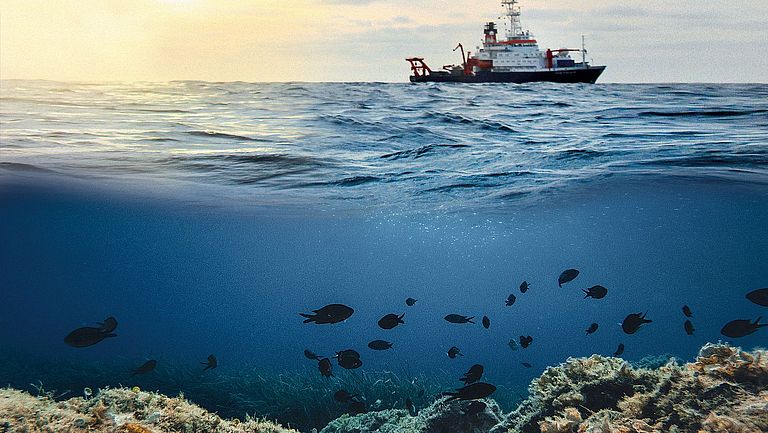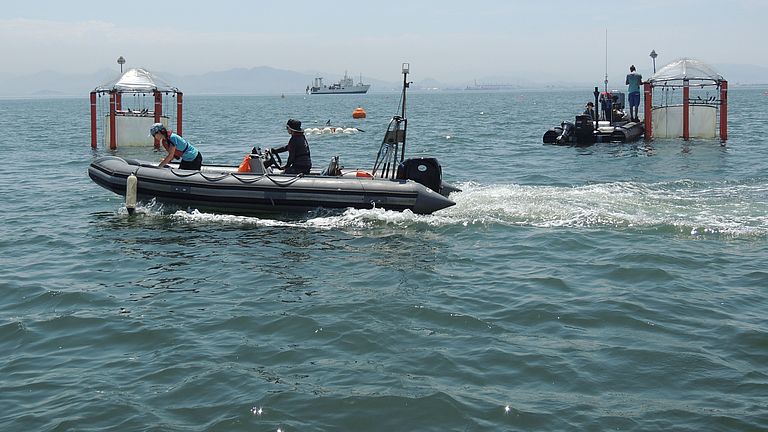GEOMAR Helmholtz Centre for Ocean Research Kiel
Communication and Media
Fon +49 431 600-2807
Mail media(at)geomar.de
The Impacts of Climate Change on Coastal Upwelling Areas

Coastal upwelling areas are located in the area of large ocean currents running parallel to the coast. Trade winds drive the water masses towards the equator. Winds parallel to the coast ensure that water near the surface moves away from the coast. This draws cold, nutrient-rich water from the depths to the surface, thus driving biological production. Illustration: GEOMAR
Although they only cover just under two per cent of the surface area of the oceans, the large coastal upwelling areas on the eastern edges of the Pacific and the Atlantic are among the most biologically productive marine areas of all. They provide 20 per cent of the world's fishery yields and are thus of enormous importance for the neighbouring countries as well as for the entire world food supply.
However, coastal upwelling areas are also subject to strong anthropogenic influences. Here ocean warming, ocean acidification and ocean deoxygenation act together and can lead to possibly synergistic effects that can have negative consequences on ecosystem functioning. High fishing pressure, coupled with often inefficient fisheries management, unsustainable economic incentives and land-based pollution also have the potential to further worsen the situation. We have reason to believe that the functionality of coastal upwelling areas is particularly sensitive to these factors, for which reliable future scenarios are lacking. Significant changes in the ecosystem services that are extremely important for humankind are therefore to be expected.
Atlantic Ocean Upwelling – a research focus at GEOMAR
However, despite intense research activities in the past, process understanding in upwelling regions spanning the physical, biogeochemical, ecological and geological systems and their interactions remains poor. For example, model projections indicate that climate change could strongly impact the intensity of upwelling in these systems, but there is low confidence in even the sign of these changes. A central element of the Integrative Research Foci (IRF) “Atlantic Ocean Upwelling” will be a multi-scale, year-round, multidisciplinary observational campaign in the tropical North Atlantic upwelling system: FUTURO - Future of Tropical Upwelling Regions in the Atlantic Ocean.
CUSCO, EVAR, REEBUS
The area around the Humboldt Current off the coast of Peru is particularly productive. There, the GEOMAR research project CUSCO was investigating from 2018 to 2021 the question of how exactly the upwelling of deep water in the region influences life at the surface and how the ecosystem reacts when the upwelling changes due to climate change.
In addition to CUSCO, two other research projects had investigated upwelling areas in the tropics. The REEBUS project from 2018 to 2021 focused on the role of eddies for the carbon pump in upwelling areas off West Africa. It was based on the observation that oceanic eddies play a central role in the physical, biogeochemical and biological properties of these systems. The third project coordinated at the Leibniz Institute for Baltic Sea Research in Warnemünde (IOW) is called EVAR and dealed with the upwelling system of the Benguela Current off Southwest Africa.
OceanStories.EBUS Playlist on the GEOMAR Youtube Channel.
OceanStories.EBUS Blog on the Oceanblogs Platform.






